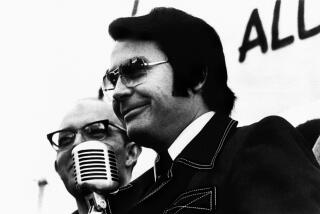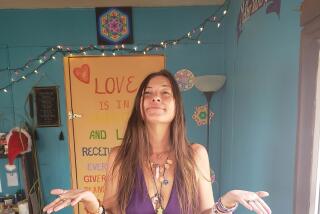TV REVIEW : PBS’ ‘Women’ Doesn’t Define Spiritual Movement
- Share via
Canadian filmmaker Donna Read admits late in her three-part, three-hour film study “Women and Spirituality” that she and her crew at first felt uncomfortable shooting the ritual ceremonies practiced by feminist spiritualists, paganists and witches in North America and England. They got over it, she explains, understanding the purpose of the rituals as an act of reverence for the Earth--the heart and soul of eco-spiritualism.
Alas, to the casual viewer of Read’s massive and beautiful film, whatever understanding Read gleaned to bridge that river of discomfort is never fully articulated. Against her obvious desires, the image of the ritualists on the screen suggests a bunch of white people going native.
It is only partly Read’s problem. The movement itself has yet to describe its full meaning and foundation, despite a growing library of books on the subject by, among others, Charlene Spretnak, Susan Griffin and Starhawk--all of whom the film prominently features. Especially in the first section (“Goddess Remembered”) and the third (“Full Circle”), the religion’s value--”Do as you will, harm none”--and its dominant terminology of “reverence” for the Earth, of a striving for “balance” and “wholeness,” is so conceptually vague as to mean almost anything.
Much clearer is the middle section (“The Burning Times”), in which Read turns to history and such historians as Barbara Roberts and Irving Smith to tell the gruesome account of early Christian Europe’s persecution of women, some of whom held to ancient pagan customs, as witches. Susan Trow’s rich cinematography somehow makes the etchings depicting the witch burnings and the horrendous torture devices all the more blood-curdling.
But, even here, some skepticism is in order. The entire film’s telling of history is remarkably slanted so that the military machine of the Roman Empire is described as respectful of nature-based religions, while the ancient Greeks come off as a dastardly lot of no-good men. Roberts astoundingly couches the Renaissance’s scientific revolution as men using the Inquisition’s torture machines to study nature. Christianity, material and industrial civilization and the culture of Aeschylus and Shakespeare get the same treatment that the old female pagans got: demonization.
“Women and Spirituality,” produced from 1989 to 1992 by the National Film Board of Canada, is, on one level, a gorgeous travelogue taking us to Avebury, Chaco Canyon, Palenque and other primeval sites. On a deeper level, though, it demonstrates how eco-spirituality is firmer about the history of such pre-Christian goddess-based societies as the Minoans, Celts and Urubans and the subsequent era of persecution than about its own content. Read’s inquiry is spelled out in personal terms in the final hour, but what’s heard is the voice of mystification.
Yet the voice can’t hide the contradictions. The values, for instance, of “the personal is the political” and “nature” were also shared by the Nazis, and the movement’s equation of peace and nonviolence with nature--which is seldom peaceful and endlessly violent--will not square.
* “Women and Spirituality” airs in three parts on KCET-TV Channel 28, tonight through Wednesday at 10 p.m.
More to Read
The complete guide to home viewing
Get Screen Gab for everything about the TV shows and streaming movies everyone’s talking about.
You may occasionally receive promotional content from the Los Angeles Times.






